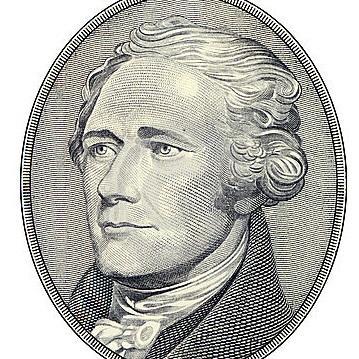From humble beginnings, a new musical has moved onto Broadway this July. Quite fitting, in a way, for the story of an American who was all about moving onward and upward. The play is called Hamilton, the story of our youngest founding father and the man on the 10-dollar bill (for now). Hamilton, created by Tony and Grammy award winner Lin-Manuel Miranda, is destined for success. The critical darling sold out 119 performances at the off-Broadway Public Theater and brought in $27.6 million, with over 200,000 tickets sold before its July 13th opening. These are huge numbers for Broadway, and among the biggest pre-opening totals in history. Nonetheless, the popularity surrounding Hamilton the man and Hamilton the musical does not come at an auspicious time for one of America’s heroes.
On June 17th, Treasury Secretary Jack Lew shocked many, including former Chairman of the Federal Reserve Ben Bernanke, when he proclaimed that Alexander Hamilton (1755-1804)–the first and foremost Treasury Secretary–would be demoted and share the ten-dollar bill with a yet unnamed woman. Undaunted by widespread criticism, Secretary Lew continued to press his case at an event at the Brookings Institution on July 8th. When asked about the ten-dollar bill’s selection, Secretary Lew insipidly claimed that it was the “next up” for redesign in order to combat forgery. The diminution of Hamilton, for whatever reason, is simply indefensible.
I would say that Secretary Lew should do himself a favor and buy a ticket to “Hamilton,” but he’s already seen it. How ironic. On August 26th, Secretary Lew, former Secretary Timothy Geithner, and former Secretary Robert Rubin were all coincidently at the same Hamilton performance. As Mr. Rubin remarked: “[Hamilton’s] sense of fiscal responsibility is still alive in the Treasury—people do identify with [him].” Mr. Lew echoed Mr. Rubin’s observations by saying, “Alexander Hamilton left an enduring mark on our nation, and all of his successors, including me, are indebted to him.” I, however, am having a hard time believing that Mr. Lew is being honest on the matter.
Does Mr. Lew know who Alexander Hamilton was? Hamilton was a world-class financier. He established a federal sinking fund to finance the Revolutionary War debt. Moreover, he engineered a large debt swap, in which the newly created federal government assumed the debts of individual states. By August 1791, federal bonds sold above par in Europe, and by 1795, all foreign debts had been paid off. Hamilton’s solution for America’s debt problem provided the country with both credibility and a confidence shock.
In addition to being the first and most distinguished Treasury Secretary, Hamilton was also a renowned journalist and lawyer. His most famous journalistic project was a collaboration to produce a series of 85 opinion pieces that called for the ratification of the Constitution. These essays are called The Federalist Papers and are among the most cited sources by the U.S. Supreme Court.
Hamilton’s work as a lawyer was well respected among his colleagues. Chief Justice of the U.S. Supreme Court John Marshall is known to have said that he was a mere schoolboy next to Hamilton. Indeed, in three of Marshall’s landmark decisions–Marbury v. Madison (1803), Fletcher v. Peck (1810), and McCulloch v. Maryland (1819)–he turned to Hamilton’s legal writings for guidance.
Thirty members of the Brookings Institution are seeing Hamilton this fall because they feel that Alexander Hamilton “best symbolized a seriousness of purpose around economic policy, fiscal responsibility, and support of the central government.” I hope that Mr. Lew’s recent trip to Hamilton has imbued him with a greater respect for Alexander Hamilton. He was in need of it.


0 responses on "Hamilton: A Life Fit For the Stage"